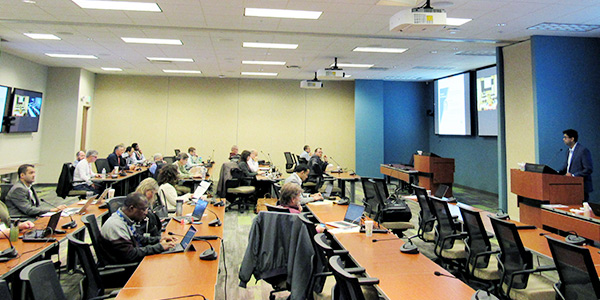MISO’s Steering Committee is debating whether to propose a new rule that would require consultants to identify the clients they represent when participating in stakeholder meetings.
A number of stakeholders have pressed for the rule, but the Planning Advisory Committee has reported that some consultants are reluctant to reveal their clients before offering comments or criticisms on MISO presentations. (See “SC Mulls Consultant Transparency,” MISO Steering Committee Briefs: Feb. 19, 2020.)
The Steering Committee again took up the issue during a Wednesday teleconference.
“This is not an issue that I’m personally raising; I’m raising it on behalf of several stakeholders,” said PAC Chair Cynthia Crane, of ITC Holdings.
“This is beyond simple courtesy. It’s so we can understand the perspective of the requests being made,” Crane said. “These consultants are making significant requests of MISO staff to change analyses and processes. … Other stakeholders can’t identify the driver of comments being made, and essentially those remarks are being made in a vacuum.”
The PAC currently requests that all meeting attendees first identify themselves and companies they represent before speaking — a request that is not always followed.
“There are a whole range of vested interests in the PAC. And some are asking to change the inputs to planning analyses. And when you change the inputs, you change the outcome,” Crane said. “This is a very specific example of why this matters.”
“We all hammer MISO for transparency. And I guess I’ll say turnabout’s fair play,” Reliability Subcommittee Vice Chair Ray McCausland, of Ameren, said at the subcommittee’s Feb. 27 meeting.
Some stakeholders have pointed out that MISO has a loose definition of “stakeholder”: anyone with an interest in the RTO’s workings. Customized Energy Solutions’ David Sapper asked how MISO could require individuals to state affiliations when stakeholder meetings are open to “all interested participants,” according to the RTO’s Stakeholder Governance Guide.
However, the Organization of MISO States (OMS) argued the guide should be revised with the expectation that all meeting participants be prepared to announce their affiliation.
“To foster openness and transparency, the MISO Stakeholder Governance Guide should be amended to add language that defines a set of expectations for stakeholder identification in the stakeholder process,” OMS said in comments to the RTO. “These revisions should include details addressing how consultants identify who they represent when participating in any MISO meeting or process. When consultants fail to disclose this information, it puts other stakeholders and the entire stakeholder process at an informational disadvantage and does not foster a fair and level playing field.”
OMS said its members frequently announce in meetings whether they’re offering their personal opinion or the view of their states.
“Some consultants currently do effectively communicate their affiliation(s) during a wide range of stakeholder proceedings, and the OMS believes that applying a consistent rule requiring all consultants to identify their clients would not be unnecessarily burdensome,” OMS said.
Finding the Balance
But Advisory Committee Chair Audrey Penner, of Manitoba Hydro, said she wasn’t sure how far stakeholders can go in insisting that consultants divulge the identities of clients given the “stakeholder” definition and the fact that consultants can maintain that they’re sharing their personal views, not those of the company they represent.
Some stakeholders have raised the issue of consultants executing nondisclosure agreements with clients. Crane said in those situations, consultants could still announce the sector affiliation of their clients. Others have said that any new identification rule shouldn’t have a chilling effect on open discussion in meetings.
“I don’t want this to become so restrictive that good ideas are stifled out,” said Resource Adequacy Subcommittee Chair Chris Plante, of Wisconsin Public Service. He reminded other committee chairs that they can always step in to prevent a stakeholder from dominating a conversation. He also said that most consultants already notify attendees of their affiliation before making comments.
“If we’re getting someone with lots and lots of pushback, it would be nice to know who they represent to determine whether they have standing as a stakeholder — whatever that means,” MISO Director of Planning Jeff Webb said.
As an independent entity, MISO applies its own discretion in taking stakeholder suggestions, no matter the source, he said. “I think we can live with it either way. We have for a long time already.”
“I feel it would be easier for us in the stakeholder process if we knew from what perspective comments are coming from,” Clean Grid Alliance’s Natalie McIntire said.





